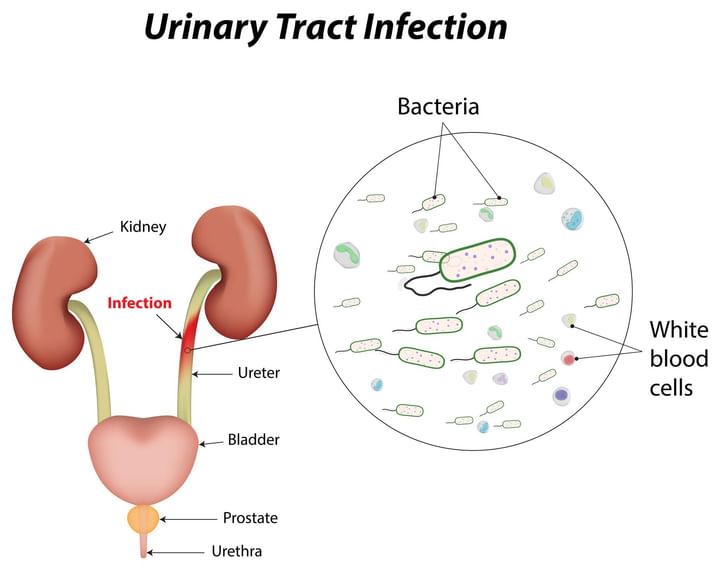UTI - Know Its Causes, Prevention & Homeopathic Treatment!
Urinary tract infections are caused by microbes such as bacteria overcoming the body's defenses in the urinary tract. They can affect the kidneys, bladder, and the tubes that run between them.
The urinary tract can be divided into 2 types -
- the upper urinary tract and
- the lower urinary tract.
The upper urinary tract consists of the kidneys and the ureters, and the lower urinary tract consists of the bladder and the urethra.
Fast facts on urinary tract infections.
- Women have a lifetime risk of over 50 percent of developing a urinary tract infection (UTI).
- Common symptoms include a strong, frequent urge to urinate and a painful and burning sensation when urinating.
- A UTI is usually diagnosed based on symptoms and testing of a urine sample.
- UTIs can be cured with 2 to 3 days of treatment.
Causes -
Bacterium Escherichia coli (E. coli), usually found in the digestive system. Chlamydia and mycoplasma bacteria can infect the urethra but not the bladder.
UTIs are given different names depending on where they occur. For example:
- A bladder infection is called cystitis.
- A urethra infection is called urethritis.
- A kidney infection is called pyelonephritis.
The ureters are very rarely the site of infection.
Risk factors -
Over 50 percent of all women will experience at least one UTI during their lifetime, with 20 to 30 percent experiencing recurrent UTIs.
As a UTI in pregnancy can prove dangerous for both maternal and infant health, most pregnant women are tested for the presence of bacteria in their urine, even if there are no symptoms, and treated with antibiotics to prevent spread.
People of any age and sex can develop a UTI. However, some people are more at risk than others. The following factors can increase the likelihood of developing a UTI:
- sexual intercourse, especially if more frequent, intense, and with multiple or new partners
- diabetes
- poor personal hygiene
- problems emptying the bladder completely
- having a urinary catheter
- bowel incontinence
- the blocked flow of urine
- kidney stones
- some forms of contraception
- pregnancy
- menopause
- procedures involving the urinary tract
- suppressed immune system
- immobility for a long period
- use of spermicides and tampons
- heavy use of antibiotics, which can disrupt the natural flora of the bowel and urinary tract
Symptoms -
The symptoms of a UTI can depend on age, gender, the presence of a catheter, and what part of the urinary tract has been infected.
- strong and frequent urge to urinate
- cloudy, bloody, or strong-smelling urine
- pain or a burning sensation when urinating
- nausea and vomiting
- muscle aches and abdominal pains
People with catheters may only experience fever as a symptom, making diagnosis more difficult.
Acute pyelonephritis -
Acute pyelonephritis is a sudden and severe kidney infection. If an individual develops this condition they could also experience upper back and side pain, high fever, shaking, chills, fatigue, and mental changes. It is considered an emergency and should be evaluated by a doctor immediately if suspected.
Cystitis -
If a person has a bladder infection, they could also experience low fever, and pressure and cramping in the abdomen and lower back.
Complications -
Most UTIs are not serious, but some can lead to serious problems, particularly with upper UTIs.
Recurrent or long-lasting kidney infections can cause permanent damage, and some sudden kidney infections can be life-threatening, particularly if bacteria enter the bloodstream in a condition known as septicemia.
They can also increase the risk of women delivering infants that are premature or have a low birth weight.
Prevention -
Taking showers instead of baths can help prevent UTIs.
There are several measures that can be taken to reduce the risk of developing a UTI:
- Drink lots of water and urinate frequently.
- Avoid fluids such as alcohol and caffeine that can irritate the bladder.
- Urinate shortly after sex.
- Wipe from front to back after urinating and bowel movement.
- Keep the genital area clean.
- Showers are preferred to baths and avoid using oils.
- Sanitary pads or menstrual cups are preferred to tampons. If you want to buy menstrual cups, then there is an excellent selection on Amazon with thousands of customer reviews.
- Avoid using a diaphragm or spermicide for birth control.
- Avoid using any perfumed products in the genital area.
- Wear cotton underwear and loose-fitting clothing to keep the area around the urethra dry.
Individuals are advised to contact a doctor if they develop the symptoms of a UTI, especially if they have developed the symptoms of a potential kidney infection.
Diagnosis -
Diagnosis will usually be made after asking about the symptoms and testing a urine sample to assess the presence of white blood cells, red blood cells, and bacteria.



+1.svg)
